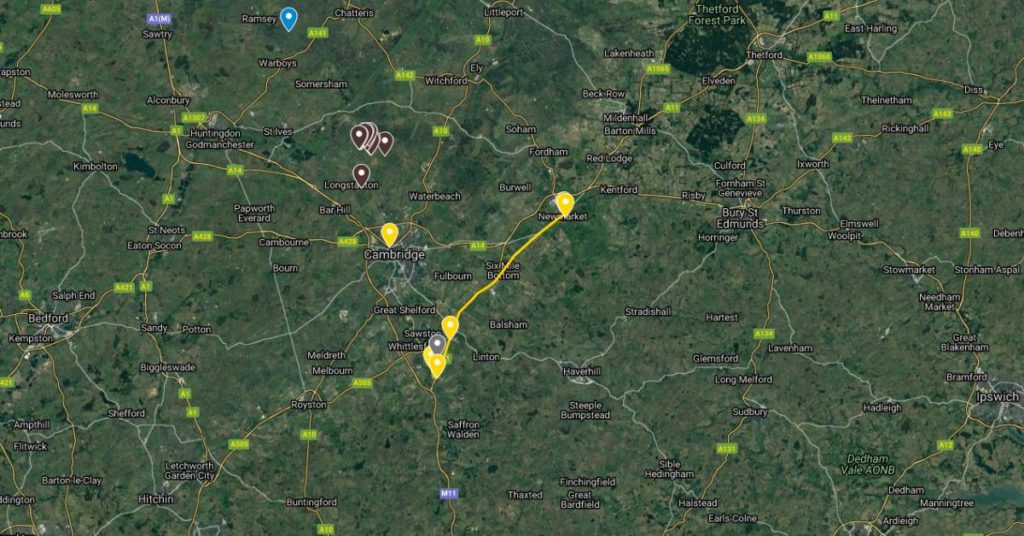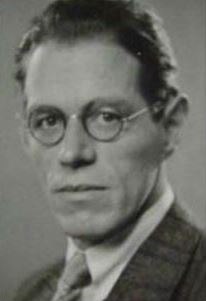
I am always intrigued to see how MI5 handled the espionage cases, how they decided whom to prosecute and whom to intern for the duration of the war. The story of Gösta Caroli is particularly intriguing because of his great attempt at escape in January 1941.
Caroli landed in England via parachute in September 1940. He was quickly captured and after being promised the life of his friend and co-spy, Wulf Schmidt, agreed to work as a double agent. After some hiccups, and an attempt at suicide, Caroli ended up sequestered in an MI5 safe house, The Old Parsonage, in the village of Hinxton, south of Cambridge. Caroli’s psyche, however, did not fare well during his confinement. Even with Schmidt’s visit for Christmas 1940, Caroli sank further into moodiness. Finally, on 13 January 1941, he snapped.
There are two rather lengthy accounts of what happened, one from Caroli’s guard, Paulton, and one from MI5’s Regional Security Liaison Officer in Cambridge, Major Dixon. Caroli’s file at the National Archives is very slim, and much has been retained by the Security Service, although it does contain Dixon’s account. Paulton’s account is included in Guy Liddell’s diaries.

Paulton’s Tale of Caroli’s Escape
Let’s begin with Paulton, one of the intelligence officers assigned to guard Caroli at The Old Parsonage in Hinxton. The other guard, a man named Williams, had apparently left for a few hours, and Caroli seized his opportunity. Paulton later recalled:
On Monday afternoon, 13 January at about 2.30 p.m., I was sitting playing a game of double patience [solitaire] when Caroli suddenly attacked me. He sprang at me from behind and with a piece of rope about 20″ long tried to garotte me. I naturally struggled with him, but he is a much heavier and stronger man than I am and I was unsuccessful.
I eventually succeeded in throwing myself sideways and we fell on the floor in front of the fireplace, still struggling. Still holding the rope like a pair of reins he got his knee into the small of my back and told me not to struggle. As I felt exhausted, I lay still for a moment – everything had momentarily blacked out – and as he tied my hands behind my back he said that “he had to do it although he knew it was a hanging job but he could not go on”. He expressed regret for his treatment of me and said I would only have to wait until 6 o’clock until someone we were expecting would return.
I told him that I could not lie tied on the floor all that time and asked him to put me on the chesterfield. He agreed and helped me over to it. With two other pieces of rope which he produced from his pockets he then tied my ankles and a longer piece was fastened around my upper arms. I was in an uncomfortable position on the chesterfield and I asked him to put a pillow under my head – this he did.
He then proceeded to empty my pockets. From my right hand trousers pocket he took some small change and my keys, from the left pocket a rosary, a couple of coins, a medal and a small penknife, together with a broken box of matches. He put the small change in his pocket and put the rest of the things on the table which was quite near the chesterfield. From my inside pocket he took a wallet and a black pencil. He glanced through the wallet and thrust it in his pocket, having taken from it his own identity card and seaman’s book, as well as my identity card. I told him that it only contained personal things so he took it out again and threw it on the table. He took several things from my side pockets and after glancing at them threw them on the table.
Taking my keys, he asked which was the key of the desk in the study. I told him and he went into that room spending some time there. He apparently opened the safe and finding an envelope in my petty cash book – in the drawer in the safe – with about £5 in notes took them. He also took the two crystals which were kept locked in the safe. He went through the desk but I do not think he took anything. The things taken from the safe I discovered afterwards of course.
He returned through the dining room and the lounge and shutting both doors went out. He was gone some time in the kitchen and then went upstairs. Shortly after he went out the telephone in the study rang – the bell is in the hall – and I called him but he ignored it.
A little later he came down with his suitcase and going back to the study collected all the maps which we had. In the lounge he took another map and my torch. He also came over and tore my wrist watch from my wrist as he could not undo it. In a drawer I think he found a child’s compass. He took the case out into the kitchen and collected a number of tins of things (two sardines, one pilchards, one pears and one pineapple). He also collected a piece of cold beef which was in the larder and three boxes of matches. He had previously taken one box of 50 Gold Flake from the lounge which I had given him that morning, and another box of 50 Players from the top of my desk in the study.
He returned in a short time with a couple of dirty handkerchiefs and told me that he would have to gag me. I told him that it was not necessary and that I could hardly swallow and asked him to fetch me a glass of water. He went out and got one and helped me to drink. He then went out shutting the doors. I lay still for some time and later heard him go out to the kitchen. After that all was quiet. I could not be sure that he had gone but I thought I would take a chance so I wriggled off the sofa and stood upright on my feet. I forgot to mention that before he put me on the sofa which stood across the French windows he had closed the shutters. In the half light I could see the electric clock and I think it was ten to three. I spotted my penknife on the table, and after groping behind my back, having first to shift the glass of water, I succeeded in picking it up. As I thought I heard a sound outside I threw myself back on the sofa with the knife, which I had succeeded in opening, still in my hand. As I heard nothing further, I set to work with the knife and after a struggle succeeded in cutting my wrists free. I then cut the rope from my ankles and around my arms.
I listened carefully and then crept into the study and at 3 o’clock dialed Major Dixon at Cambridge and reported the escape. I asked him whether he would advise London or whether I should do it and he asked me to report to H.Q.
I passed the call and waited by the phone. Just as the exchange rang to give me the call, Caroli passed the window outside pushing Williams motor bike, which he had started up, and carrying on his back a canvas canoe. I grabbed the receiver from the instrument and put it down on the desk, while I crouched down. Caroli tried to start up the motorbike with the boat on his back, but he was having some trouble. I read the number of the bike, CXP 654, and jotted it down on a slip of paper on the desk. I also noticed that he was wearing Williams leather coat and that his case was strapped on the back on the bike. He was still having trouble and I was afraid he would come back in the house for something. Meanwhile the phone was ringing silently in front of me. He then proceeded to tie the boat on somehow on the side of the bike and at 3:25 made off slowly down the drive. I waited a moment or so in case he returned and then put a call through to London and reported the escape to Mr. Marriott at 3:30. At 3:35 Major Dixon arrived and we set off in pursuit.”
A rather disconcerting experience for the poor Paulton and Williams, the absent guard, likely got an earful when he returned from his unauthorized absence. Did Dixon and Paulton find Caroli? I’ve read a variety of sources which suggest that Caroli got as far as Ely before being captured. That he ran into a cordon of police in Newmarket and was captured. That he was shot in the legs whilst trying to escape on foot after crashing the motorcycle. It’s hard to distinguish fact from fiction.
Dixon’s Account of Caroli’s Escape
Luckily, Dixon’s account, written on 14 January 1941, is preserved in Caroli’s file and picks up the tale…
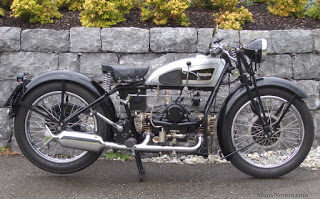
Here is the story of Caroli’s attempt to escape, from my point of view.
At approximately 2:30 p.m. on the 13th January, I received a call from Paulton, who told me that he had been assaulted by Caroli and bound hand and foot. He had just that moment succeeded in freeing himself, but in the mean time Caroli had gone. [This timeline differs slightly Paulton’s account who said he phoned Dixon at 3:00 p.m.]
I said I would go over at once to Hinxton, my object being to get a few particulars about how Caroli was dressed etc. In the mean time I told him to get through himself to Tar Robertson and tell him what had happened.
My departure from the office was slightly delayed and I only arrived at Hinxton at 3:40 p.m. Paulton was there, and rather shaken by his experience.
Caroli had apparently attacked him from behind, and put a rope round his neck and then tied him hand and foot and put him on the sofa. He had emptied his pockets, closed the shutters, and gone upstairs to collect things; he had then gone out of the house.
Paulton in the meantime had noticed a knife on the table, which he was able to get to and cut himself free. He had immediately got on the telephone to me, and after having spoken to me he spoke to Robertson, and while he was speaking to Robertson, Caroli went past the window on Williams’ Douglas motor-cycle, with a suitcase on one side of it and a 12 foot canvas canoe tied to the other side.
This shook Paulton slightly as he thought that Caroli had left sometime ago.
On my arrival I got a full description from Paulton of how Caroli was dressed etc., and telephoned this back to my office in Cambridge, so that the Police of Essex and Hertfordshire could be warned to look out for him.
We discovered that Caroli had turned South outside the grounds, so Paulton and I got into my car and did the same. At the first cross-roads we met some road men who stated that they had seen a man on a motor-cycle carrying a canoe turn left down the Newmarket Road. We proceeded till we got to Pampisford Station, where we met Mr. F. Brown, a road man of Pampisford, who said that he had seen the man on the motor-cycle with the canoe – in fact he had seen a lot of him, because the man on the motor-cycle had fallen off just by him and he had helped the man to throw the canoe over a hedge. We verified this, Paulton recognizing the canoe as one that had been in the garage at Hinxton.
We then continued straight on to Newmarket, and in the middle of the town we saw the Douglas motor-cycle that we were looking for, being about to be ridden away by a man.
I got out and recognised a Detective Constable of the Newmarket Division of the West Suffolk Constabulary, who stated that a man had just come into the Station and given himself up, and he had come down from the Station to collect the motor-cycle, which the man said he had left in the main street.
We proceeded to the Station and there found Caroli. They had searched him and made a list of the possessions that were found on him. They had not opened his suitcase and I asked them to refrain from doing so.
I signed for his possession, and took them and the suitcase and Caroli back to to Cambridge County Police H.Q. at Castle Hill Cambridge, where he was again searched and locked up.
When I was at Newmarket Police Station I succeeded in getting through to my office in Cambridge and making arrangements for the hunt to be called off. The only people who had been asked to look out for Caroli were the Chief Constables of Essex, Hertfordshire and the Cambridge Borough Police. Fortunately no express message had been sent out.
At Marriott’s suggestion I took Paulton to see Dr. (redacted – possibly Dearden of Latchmere House – given the length of the redaction and MI5s tendency to redact anything to do with the place), who examined him and found him to have marks round neck, wrists and ankles which he said would be consistent with being assaulted and bound.
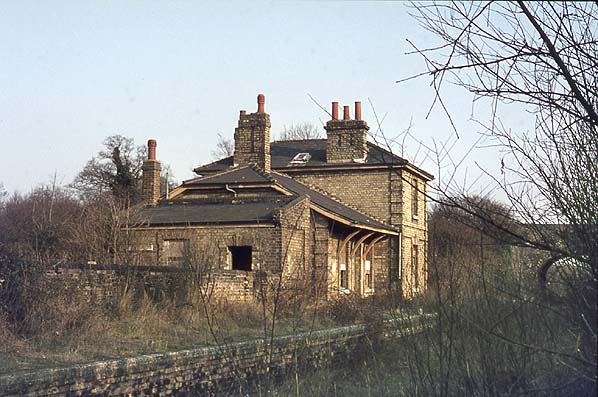
One has to feel a bit sorry for Caroli – trying to escape on a motorcycle with a suitcase on one side and a canvas canoe on the other side. Not exactly incognito. And from Dixon’s account, it’s clear that a lot of people took note of the strange sight and were able to guide the pursuers in the right direction. It’s also pretty clear that Caroli turned himself in at the Newmarket Police Station. He wasn’t shot in the legs, nor was he apprehended by a cordon of police. Liddell notes that Caroli fell off of his motorcycle in Newmarket, likely one of several falls. He must have realized the futility of his escape and decided to give himself up to the police.
Mapping Caroli’s Escape Route
Dixon’s account is quite helpful as it provides some concrete geographic markers that we can use to trace Caroli’s escape route. While some authors have indicated that Caroli was held at The Grange, earlier entries in Liddell’s diary clearly indicate he was held at The Old Parsonage. I used a Google Map to add Caroli’s escape route (in yellow).
Or, for a static version…
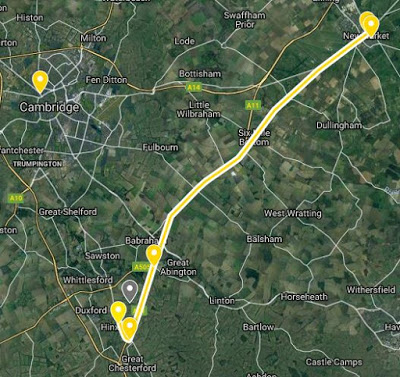
What do do with Caroli?
At the end of his 13 January diary entry, Liddell noted: “Clearly Caroli can never be allowed to use his wireless transmitter again and he will have to remain under lock and key”. Would it just be lock and key though? Or would MI5 decide that Caroli had broken his agreement to cooperate and decide to prosecute him under the Treachery Act?
A few days later, Liddell noted:
We had a long discussion this morning about Caroli’s future and that of the other people with whom he has been associated. We have all come to the conclusion that somehow or other Caroli must be eliminated. This is not however an easy matter. In the eyes of the Germans he is known to Mac [Sam McCarthy aka BISCUIT] and he has also been in touch with TATE [Wulf Schmidt]. Through Mac he is known to SNOW. If therefore we report that he has been captured the Germans may think that the whole organisation has been compromised. Various ingenious suggestions have been made. The best I think is that Mac should report that SUMMER [Caroli’s double agent code name] is on the run that he has put his wireless into the cloak room at Cambridge, and sent the key to Mac. Later we could say that he has been picked up by the police for failing to register and later still SNOW can put forward another candidate who will use his set.
It was a tricky situation. If MI5 prosecuted Caroli and executed him, word would reach the Germans, and they would naturally suspect the other spies with whom Caroli had had contact. The double-cross house of cards might come tumbling down. The ultimate decision was to detain Caroli for the duration of the war. He was sent back to Sweden after the war.
Sources
National Archives – KV 2/60 – Caroli/SUMMER file
National Archives – KV 4/187 – Liddell Diaries
